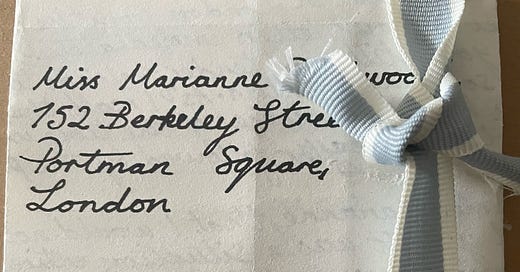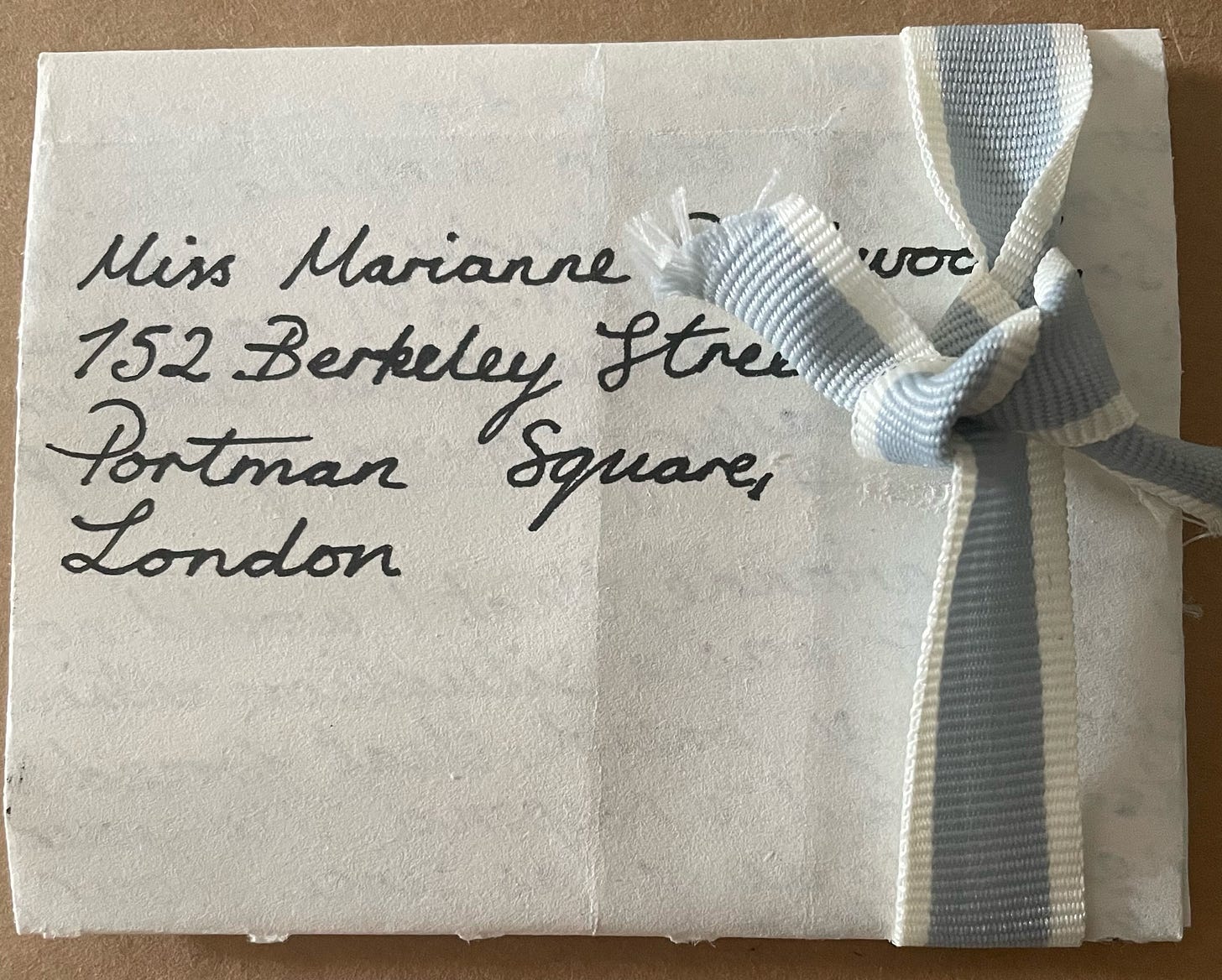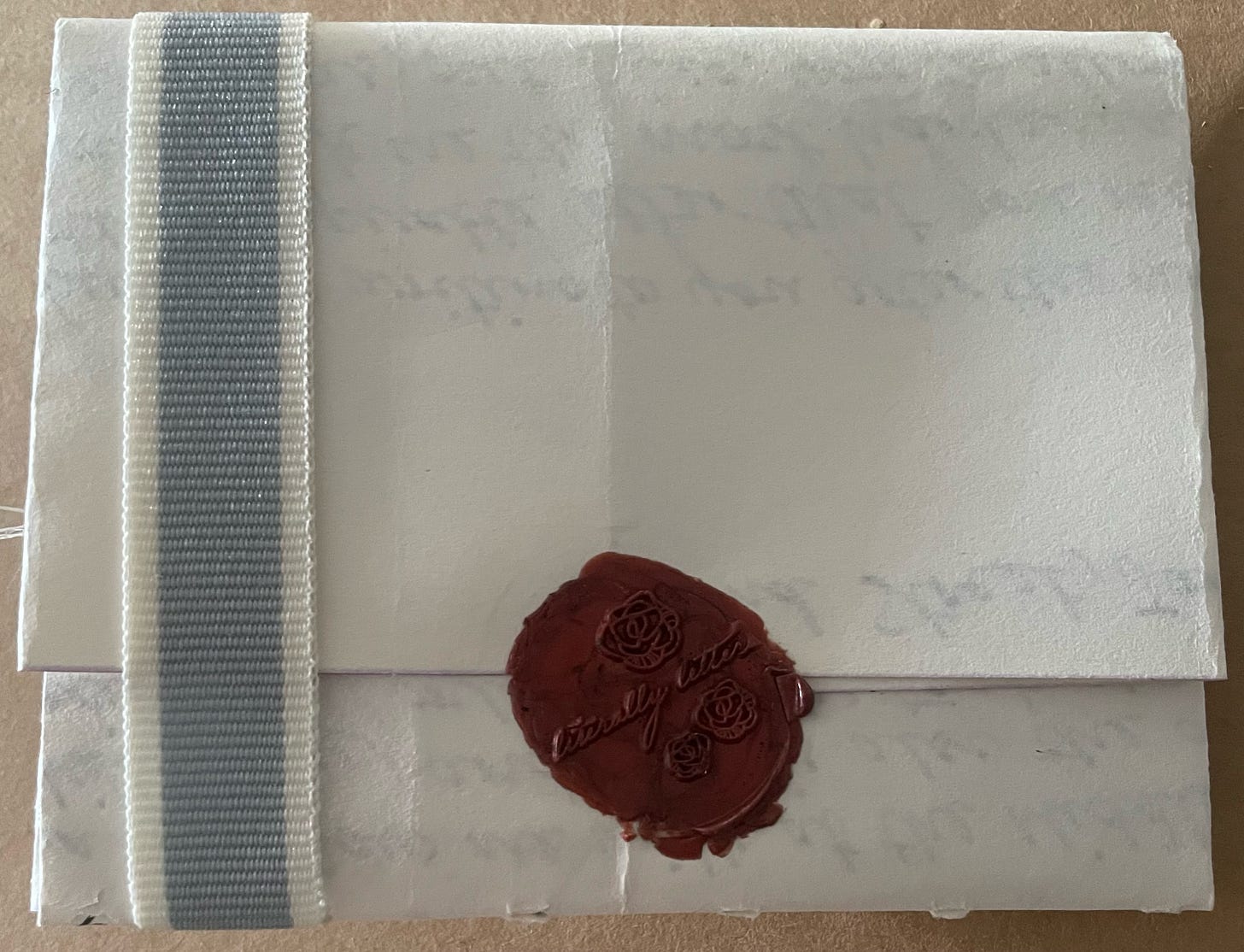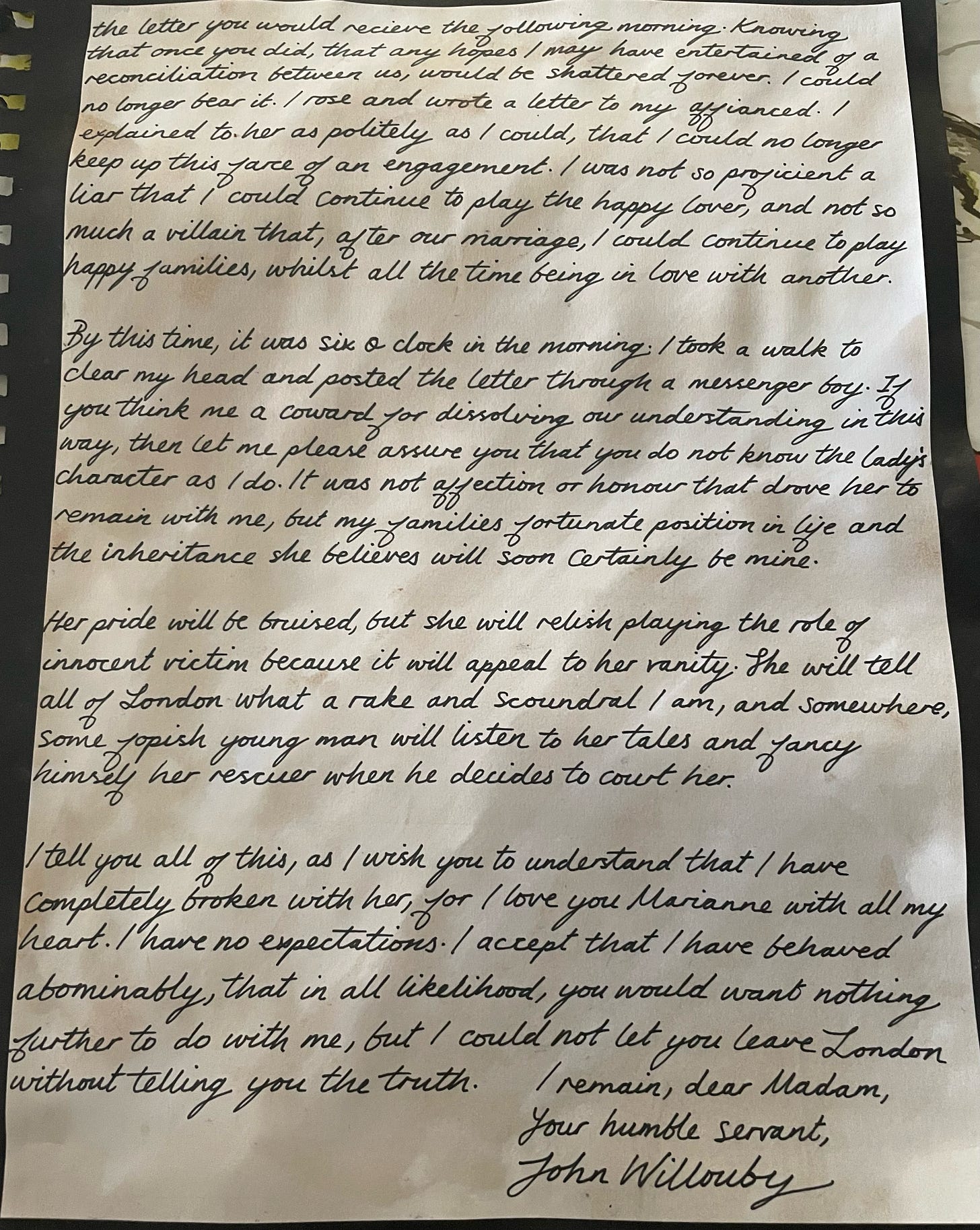What if...Willoughby was not the terrible scoundrel we thought?
Kate Howden of Literally Letters imagines a happy ending for Marianne Dashwood & John Willoughby through her mix of paper ephemera & fanfiction.

Introducing Jane Austen What Ifs…
Are there two characters in the novels you always shipped but Jane didn't let get together? Have you written the next great Austen sci-fi story: Persuasion AI? We've all imagined how each heroine's story keeps going once we finish the last page. We've all got Jane Austen fanfiction. I'd love to spotlight some of yours.
When I asked Kate Howden, who runs Literally Letters on Instagram, if she wanted to create one of the letters from Austen’s novels, she told me she had an idea to continue the correspondence between John Willoughby & Marianne from Sense & Sensibility. I’ll admit I was skeptical.
“Do readers still ship Marianne & Willoughby after learning of his scandal & true character?” I thought. I even asked Kate if she saw this match working.
“I believe I did always want Marianne to end up with Willoughby,” Kate tells me, “despite the obvious flaws in his character.” She goes on to say that she likes Colonel Brandon enough but wanted to explore an alternate ending for Marianne.
“I find Marianne a very interesting character, & her steadfastness to Willoughby very endearing,” she says.
The end of S&S does fall a little flat, especially when compared to the novel that comes next—Pride & Prejudice. The pairing of Marianne & Colonel Brandon (& even Elinor & Edward Ferrars) is certainly not of Darcy & Lizzie caliber. I’ve always read S&S as the seedling of P&P, right down to Willoughby being the first iteration of perhaps Austen’s most devilish cad George Wickham. While both scoundrels are driven by their own pleasure, live beyond their means, & use women for their amusement, there is a reading of Willoughby as having principles & the capacity to fall in love, which could explain the apology he conveys to Elinor while Marianne is on her sick (no longer death) bed. And this is what Kate explores in her epistolary fanfiction.
Willoughby’s Big Scandal
Colonel Brandon confides in Elinor that Willoughby had seduced his 15-year-old ward, Miss Eliza Williams, & abandoned her after getting her pregnant. He finds Willoughby & both partake in a duel—”he to defend: I to punish” (p. 211). Because Willoughby refuses to make amends to Miss Williams, his aunt disinherits him, leaving him penniless & in want of a wife with a fortune; he goes to London to seek such a prospect, forgetting Marianne.
Here’s some context from Kate on how her letter relates to the book:
“I have written this letter to be read after Marianne & Willoughby’s short letter exchange that takes place in the book (when they are both in London). After Willoughby’s letter (actually [dictated] by Miss Grey) [is sent to end] all contact with Marianne, comes this letter from Willoughby.”
We know Willoughby tells Marianne that his aunt is sending him to London on business, forcing him to leave abruptly. (Having read S&S, we know the real reason is to find a rich wife to pay his debts now that he’s been disinherited.) Elinor & Marianne then go to London for the winter at the invitation of Mrs. Jennings. Almost immediately upon arrival, Marianne dashes of three improperly familiar letters to Willoughby—addressing him as “Willoughby” not “Dear Sir”—requesting him to call on her. The letters go unanswered. It’s only at a ball that Marianne meets Willoughby by chance & confronts him about the letters. He treats her coldly.
The next day, not only does he return all her letters & the lock of hair she sent him, but he includes an epistle of his own:
From the novel
“My dear Madam,
I have just had the honour of receiving your letter, for which I beg to return my sincere acknowledgements. I am much concerned to find there was any thing in my behaviour last night that did not meet your approbation; and though I am quite at a loss to discover in what point I could be so unfortunate as to offend you, I entreat your forgiveness of what I can assure you to have been perfectly unintentional. . . . It is with great regret that I obey your commands of returning the letters, with which I have been honoured from you, and the lock of hair, which you so obligingly bestowed on me.
I am, dear Madam,
Your most obedient humble Servant,John Willoughby.” (pp. 208-09)
What I find interesting about Kate’s fictional letter is how it plays with a few elements from the book to reshape how we might think of Willoughby’s character:
the breakup letter he sends Marianne
Willoughby’s apology
the revelation that Miss Sophia Grey conceived of the awful breakup letter
Kate’s confessional letter plays up Miss Sophia Grey, a woman with a £50,000 fortune & Willoughby’s fiancée, as a villain. In the book, Willoughby blames Miss Grey, too, when he conveys his apology to Elinor, but it comes across as callous not just because he posts the letter anyway, but because his apology comes after Marianne has become deathly ill.
In Kate’s version of events, Marianne receives this apology directly from Willoughby the day after she gets his “I’m-sorry-you-misconstrued-my-feelings” letter. By moving the apology up in the narrative, it certainly paints Willoughby as more of a flawed character who needs to become worthy of Marianne. The letter signals that Willoughby has reflected on his actions (both toward Marianne & Eliza Williams) & feelings for Marianne.
Perhaps more importantly for an Austen hero, this letter indicates that he has chosen love over money.
Willoughby’s fictional apology letter: How events might unfold
Bond Street, January
Dear Marianne,
I know I have no business writing to you after the events of two nights ago1, & the despicable letter that you received by my hand. No doubt you think me the most hardened villain & scoundrel that ever was, but I beg you to allow me to explain myself.2
I was aware of your arrival in London from the first, & being here myself, I received your letter immediately.3 I confess I was surprised that you still held tender feelings towards me, especially after so many months. As I read them, I was overwhelmed with happy memories of the time we spent in Devonshire, shortly thereafter followed by the painful recollection of our final meeting.
You must believe me, Marianne, that I would not for the world have abandoned you. It was a situation entirely of my own making but beyond my control,4 that forced the farewell I so acutely regret. I longed to respond to your notes but found myself unable to do so, as since your parting, I have engaged myself to another.
She is the woman you saw with me at the Middleton’s two nights ago, a Miss Sophia Grey,5 & she is also the one who wrote the letter you received.6 I only had the task of servilely copying that which almost broke my heart to write, especially when she bade me to return your other notes & the lock of hair you so willingly bestowed on me.
After I left Devonshire, I, in my ignorance, assumed you must have become indifferent to me, surrounded as I was by the distractions and frivolities of London. But last night, after copying that awful letter, my thoughts were consumed with the pain I must have caused when I left, & the pain I was still to inflict, by
[flip letter]
the letter you would receive the following morning. Knowing that once you did, that any hopes I may have entertained a reconciliation between us, would be shattered forever. I could no longer bear it. I rose & wrote my affianced. I explained to her as politely as I could, that I could no longer keep up this farce of an engagement.7 I was not so proficient a liar that I could continue to play happy families, whilst all the time being in love with another.
By this time, it was six o’clock in the morning. I took a walk to clear my head & posted the letter through a messenger boy. If you think me a coward for dissolving our understanding in this way, then let me please assure you that you do not know the lady’s character as I do. It was not affection or honour that drove her to remain with me, but my family’s fortunate position in life & the inheritance she believes will soon certainly be mine.8
Her pride will be bruised, but she will relish playing the role of innocent victim because it will appeal to her vanity. She will tell all of London what a rake & scoundrel I am, & somewhere, some foppish9 young man will listen to her tales & fancy himself her rescuer when he decides to court her.
I tell you all of this, as I wish you to understand that I have completely broken with her, for I love you Marianne with all my heart. I have no expectations. I accept that I have behaved abominably, that in all likelihood, you would want nothing further to do with me. But I could not let you leave London without telling you the truth.
I remain, dear Marianne, your humble servant,
John Willoughby
An interview with Kate Howden of Literally Letters
Modern Austen: How did you get started making these letters? What do you like about doing this?
Kate: When I would read books, especially classic novels like Jane Austen, & the characters received a letter, I found myself wishing I could have a copy of that letter to open myself. I like recreating letters because I feel like I’m making the stories & the characters more real for people.
Modern Austen: How can people reach out to have a letter created?
Kate: If anyone has anything specific they would like to see, they can feel free to DM me through my instagram.
Modern Austen: Do you have a pen pal? Have you always liked writing letters?
Kate: I do indeed have a pen pal! Her name is Jemima, & I have written to her on & off since I was a little girl. I keep all her letters tied up together with a ribbon (in true regency style) in a little tin box. So, yes, even as a young girl I loved writing letters. Discovering new words to describe my thoughts & emotions, blowing the ink dry, & adding postscripts for news I had forgotten in my haste to get everything on the page—I enjoyed every moment of it.
Modern Austen: Which Austen novel do you think has the best letter exchanges?
Kate: After some thought, I would have to say the letter exchange between Willoughby & Marianne in Sense and Sensibility. Despite receiving no response from Willoughby & being abandoned by him in Devonshire, it’s clear that she still loves him & desperately wants there to be another explanation for his lack of response—other than the one she fears. It was these letters that prompted this project, as I wished to further explore this storyline & both characters, but especially Marianne, as I think she makes an interesting character study.
Have your own Jane Austen What Ifs…? Send them to modernaustenblog@gmail.com to be featured in an upcoming issue.
Marianne confronts Willoughby about not replying to her letters at a ball. He treats her coldly & gives his attention to another, Miss Sophia Grey.
It’s not just his letter that makes him despicable.
Marianne writes three improper letters to Willoughby when she arrives in London, written so quickly that they could be little more than notes. See Peter Sabor’s “Good, Bad, and Ugly Letters in Sense and Sensibility” in Persuasions On-line, 32(1), (Winter 2011).
Can we trust Willoughby’s account?
I’ll just say this: A fortune of £50,000.
But can this absolve Willoughby of sending the first letter?
Willoughby’s willingness to end his engagement to Miss Grey for Marianne indicates that he’s willing to choose love over fortune.
Little does Miss Grey know that his aunt has disinherited him.
Foppish is defined as being concerned with one's clothes and appearance in an affected and excessive way (typically used of a man). See “Foppish.” Merriam-Webster.com Dictionary, Merriam-Webster, https://www.merriam-webster.com/dictionary/foppish. Accessed 30 Apr. 2023.









